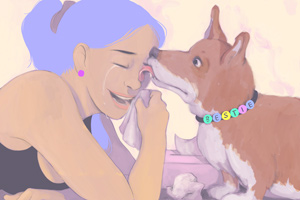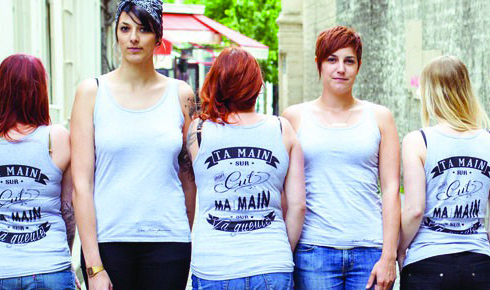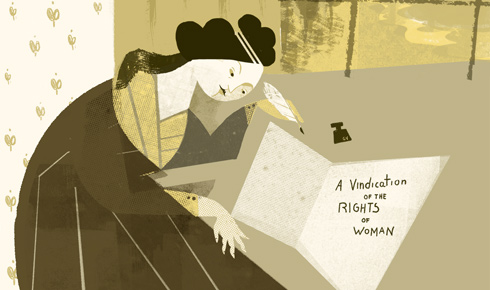Trigger Warning: Sexual violence

Sometimes, when you travel across Europe to take part in a workshop, you end up having to share a room with someone you don’t know. “How will she be like? Will we get on?” That’s how I met Chloé, and I needn’t have worried: we got on alright. Something we had in common that helped us become friends was feminism. “When it comes to catcalling and street harassment, Paris is the worst”, she told me. Paris? Seriously? I couldn’t believe it.
Therefore, I decided to interview the girls from Colère: Nom féminin, a collective (of which Chloé is part) that actively fights so that street harassment is recognised for what it is: a form of harassment, and not a compliment.
First things first: when was Colère: Nom féminin founded? What were your aims when you created it? Have those aims stayed the same, or have they evolved over time?
Colère: Nom féminin was founded in April 2014. The aim was to try to find our own way to raise awareness about street harassment in France and to help the other collectives currently working on this issue. The goal in itself didn’t really evolve, but our visibility did, and it did so very quickly. At the beginning, we expected to get dozens of orders, we actually got thousands of them! And it was great news, because it meant we could think about larger donations and actions and make a real difference.
You are very active in raising awareness about street harassment. How is the situation in Paris at the moment? Do you feel anything has changed since you started speaking out about street harassment?
The good thing is, for a year or so, we have had quite an active Ministère du droit des Femmes (Ministry for Women’s right) and they really do pay attention to online feminism and new projects. Pascale Boistard, the Secretary of State in charge of women’s rights, clearly stated that fighting street harassment is a top priority. The company in charge of public Parisian transports (RATP) also released a very striking campaign against street harassment. So we guess that things are slowly improving…
But still, street harassment and aggressions towards women are very common phenomena in big cities in France. Half of Colère’s crew lives in Nantes, a big town but still smaller than Paris, and they experience the same level of discomfort in public spaces. Even for a charming and supposedly safe town like Nantes, creepy stories happen all of the time. To quote only one, a really awful one: this summer, in downtown Nantes, a woman was raped TWICE in the same evening.
Unlike in countries like Norway, Sweden or even Great Britain [editor’s note: things aren’t that rosy in the UK either], many French people still think wearing a skirt means one should accept the risk of being raped, harassed. So yes, there’s still work to be done…

Laura, 27 years old, student. “Rape fodder”
This is what street harassment is.
When I saw your bags and T-shirts, I showed them to my friends, and we all agreed on how cool and necessary they are. We especially like that they are a way to express what we might not feel comfortable /safe in saying. How did that idea come along?
The idea first came from Laura, who created the association first, before asking nine friends if they wanted to join her (we all said yes, of course!). She was walking in downtown Nantes, in the middle of the afternoon, in a supposedly safe neighbourhood, when a guy called her “viande à viol” (“rape fodder”), which is the most awful and demeaning insult one could make up (it’s not a common insult in French, it’s more of a creative way of threatening and humiliating somebody).
She was absolutely shocked and decided it was time to react. She came up with this idea of a simple yet efficient way to display our refusal. Because street harassment isn’t something one can accept, no matter why, no matter where it happens. Wearing a comeback, a few deterrent words, is a way of displaying a clear message but also of encouraging dialogue about those issues. If one is shocked, disturbed or puzzled by this slogan, we’re there to talk about it.
Maybe we’re also tired of people expecting girls to be polite and respectful and not too rude when they express their discomfort towards sexual violence… Many people told us “You know, “Ta main sur mon cul ma main sur ta gueule” (“Your hand on my ass my hand in your face”) sounds very aggressive…”. Well, if you feel hurt by this sentence, maybe you should start questioning yourself, because it’s supposed to only concern people who do put their hands on our asses.
Your photo project where you quote the words and insults hurled at the girls is very powerful. Can you tell me how you came up with that idea? Who did you want to see these pictures the most? What reaction were you hoping to get?
For a while Chloé (the team’s photographer) has been willing to express what it feels like to be catcalled (or insulted) when you’re just walking in the street or having a drink, because you’re neither asking nor waiting for it. Never. It’s always a very unpleasant surprise and the violence comes from the gap between your “inner life” and this sudden intrusion. This is why the pictures are bright, colourful and clean: the feeling they express is totally incompatible with the very violent words they produce.
The idea was also to show that the obscenity (of our clothes, appearance, face, body for example) resides in the eyes of the beholder. From that idea, we all chose the texts and situations together, and then the other Colère girls suggested to set a clear message, which is: “THIS is what street harassment feels like and no, it’s not flirting”. This helps the viewer to move from the initial shock to a deeper level of thinking.
And we wanted to question everybody. People who consider street harassment as some fancy of ours, witnesses who don’t intervene because they’re afraid or ignorant… But also men and women who experience street harassment without putting a name on this phenomenon.

I saw that you organize self defence classes. Could you tell me more about the initiatives backed by Colère?
Indeed, Colère: Nom féminin organised and funded self-defence classes for over 250 women in Nantes and Paris. It’s a good way to improve self-confidence, plus it’s always good to know the bases to defend yourself. It was a very cathartic process, too. We also made a donation of 3000 US dollars to Hollaback! movement in order to help finance their future campaigns and actions.
The idea with Colère : Nom féminin was to provide funds to people and associations who really make a difference in the field. By investing all of our benefits in this, we chose a very concrete way of acting: you don’t have to wear your t-shirt in the street and showing it to everybody to act militant, just buying it is already helping the cause.

No means no
What do you think is Colère’s greatest achievement so far? What are you most proud about?
The last session of self-defence classes in Paris was really something. It was obvious that most of the participants had already been victims of aggressions, one or several times. But both of the teachers (a man and a woman) were amazing and took the time to answer everybody’s questions and to provide real solutions.
It felt like a very cathartic moment, a safe place where everybody could face what they’d been through and rewrite the story by knowing how they could have unsettled their assailant. And even if we were talking about very serious stuff, we would very often end up laughing and feeling relieved. It was like asserting “No, we’re not afraid” and it made us feel good. Even if, of course, we’re still a bit afraid…
We’re also very happy that Colère: nom féminin is now a new way to open debates. Some of us had the opportunity to talk with many people who weren’t even aware it is a big issue for many of us. We’re glad Colère created something that catches people’s attention and starts discussions about this complex topic.
 Soon, Colère: Nom féminin will cease to exist in its current format, turning instead into a platform to raise awareness and discuss about street harassment and sexism.
Soon, Colère: Nom féminin will cease to exist in its current format, turning instead into a platform to raise awareness and discuss about street harassment and sexism.
It’s while thinking about this evolution that I come to a realisation: every time I’ve been to Paris, I was with a guy – my father, my boyfriend, some male friends.
It was probably this, more than anything else, that shielded me from the comments, approaches and groping experienced by Chloé and other friends who live in or have been to Paris with their female friends. And for the millionth time I realise that yes, there is still a lot of work to be done.
All pictures are by Chloé Vollmer-Lo.






Nessun commento